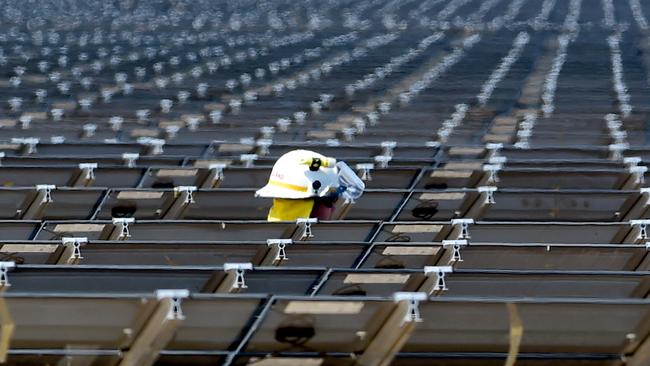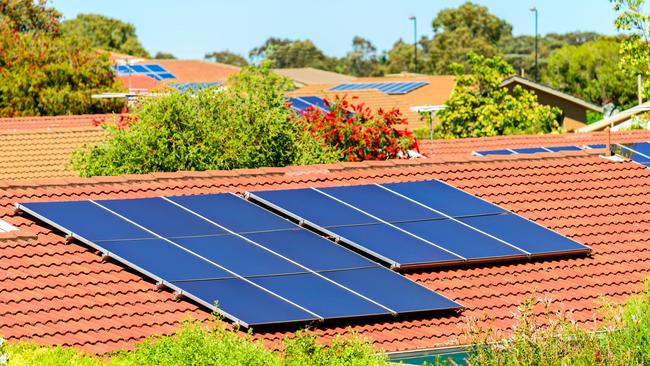Here’s what you should know before going solar
For many Australians, converting a home to solar seems to be the way of the future. But how do you get the best investment and the right system in an unregulated market? Here’s what you need to know, writes Domenico Gelonese.
Rendezview
Don't miss out on the headlines from Rendezview. Followed categories will be added to My News.
With two million solar systems now installed across Australia, it’s evident the adoption of this renewable energy source is not slowing down.
However, with an estimated 5,000 registered solar installation companies, the regulation of the industry is proving difficult to manage with a number of rogue operators continuing to defy standards.
While ongoing news reports shroud these dodgy installers, it is unsurprising to learn that a national audit found approximately 22 per cent of solar system installations were inadequate.
Further to this, Sunwiz reported that 52 per cent of solar systems are not performing to their specification.
MORE OPINION: Our power prices now killing jobs and businesses
This poor performance is going largely unnoticed as they have no form of smart monitoring, costing each householder thousands of dollars over the life of their solar system, which is a high price to pay when you’ve already forked out thousands for the system and installation itself.

While solar customers are still paying on average $538 per year less than non-solar customers, it is a misconception that solar will significantly slash everybody’s electricity bill.
What is apparent, however, is that the solar industry is still in a constant state of disequilibrium making the choice of panels and installers a maze for everyday Aussies.
RELATED: The world just experienced the hottest June of all time
From wide ranging prices for similar 6kW system sizes (around $2,500 — $7,000), contrasting hardware quality, service inclusions, installation quality and after sales service, it can be incredibly difficult for consumers to grasp the differences in the various solar system offers.
So it begs the question, why is smart solar so important?
Standard solar versus smart solar
In reality, standard solar takes on the approach of install and hope, often sold by salespeople using cookie cutter usage templates that over-inflate the benefits of installing solar. Without using individual household data the system size sold may be too small for the home (resulting in the loss of additional savings) or too large (increasing payback time).
However, for consumers to adopt smart solar, there must first be strong consideration of a home’s individual energy profile. You wouldn’t buy clothing that doesn’t fit your body shape. and the same theory applies when choosing the right solar system for your home.
MORE OPINION: The energy solution we can all agree on
By conducting thorough research, consumers should be able to find a reputable company who can ensure that the solar system is installed correctly. However, as these providers only have access to a rudimentary energy bill, the solar system recommendation they provide may not match a customer’s actual needs. What is important is not how much energy you use, but rather at what time of the day you actually use it.
Further, smart solar systems ensure savings are maximised and that the installed solar system continues to earn the householder money every day.

Smart solar leads to smart home battery decisions
As a smart solar system helps reduce a home’s reliance on the electricity grid during the day, a home battery also helps to reduce a home’s dependence on the grid during both day and night.
Understanding your home’s individual energy profile, the complexity in choosing the correct home battery system is removed. Still relatively new to the domestic market, battery storage is still more expensive than most solar systems, so naturally the financial risk of making an incorrect decision is greater.
MORE OPINION: Politicians lagging on renewables will soon be fossils
Through understanding the actual energy data via a smart ‘whole of home’ energy monitoring system, householders can see whether their home generates enough excess solar power to store in a battery and whether this stored battery energy will be fully consumed.
With smart solar still a relatively unknown category for many and the new push towards solar storage via home batteries ramping up, Australians must be vigilant to avoid emptying their wallet on dodgy or inadequate systems. The first part of this energy puzzle is to collect your household energy data. After all, we all want bang for our buck in this current economy.
Domenico Gelonese is the CEO of Embertec.


